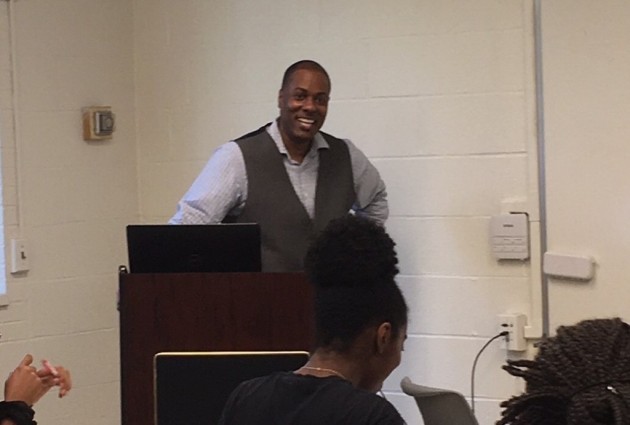
Photo Courtesy: Kyra Azore. Dr. Michael C. Campbell lecturing to his Evolutionary Medicine class.
Known as the Canadian genetics professor who insists on having class during First Friday and Yardfest, Michael C. Campbell, Ph.D., is making strides in the field of evolutionary biology. The Howard University assistant professor recently co-authored a paper about a new method for determining genetic differences between humans and chimpanzees, and it was published in Oxford’s Journal Molecular Biology and Evolution.
“Detection of Regional Variation in Selection Intensity within Protein-Coding Genes Using DNA Sequence Polymorphism and Divergence,” published in the July 28 issue of Molecular Biology and Evolution, describes unique two-fold gene analysis method. Model Averaged Site Selection via Poisson Random Field (MASS-PRF) allows researchers to pinpoint, which changes in genes between chimps and humans were beneficial to human evolution.
“We developed a method that builds on previous methods that didn’t have the same weakness. That weakness of looking at genes as a whole and not a region” said Dr. Jeffrey P. Townsend, one of the other authors of the paper and associate professor in the Yale School of Public Health, describing the method he and Campbell developed.
Previous techniques used for gene analysis focused on the whole gene sequence. Campbell’s method, however, enables scientists to examine mutations that occur among genes in smaller clusters. This method can be beneficial in studying disease susceptibility in smaller, more specific human populations, like hypertension and sickle cell anemia.
The traits linked to these diseases may have been beneficial to these population’s ancestors, but cause harm to those carrying the traits today. Using MASS-PRF to determine where genetic changes took place to cause such traits to appear could one day aid in drug development for these diseases. “Conceptually we knew they [gene mutations] were there, but this gives us a method to detect them,” said Dr. Nadia Ayoub, associate professor of biology at Washington and Lee University, about how Campbell’s research has impacted the field of study.
“I think it will be used a lot, it’s something I will probably use very soon,” said Ayoub, about how Campbell’s research will be used within the field of evolutionary biology.
“We’re individuals, we originated from populations, populations have a history,” Campbell said. “Some populations have a higher prevalence of some diseases compared to others. So my hypothesis is that [it] is probably due, or at least in part due, to differences in population history.”
Campbell gained an interest in genetics while working on his masters of human biology at Oxford. After completing that degree, he went on to receive his doctorate in genetics from Columbia. Campbell completed his postdoctoral research in African genetics diversity at the University of Pennsylvania, before joining the faculty at Howard University in August 2015. Since joining the faculty Campbell has taught classes in evolutionary medicine, ecology and evolution.
“Dr. Campbell is terrific to work with. He’s very enthusiastic and careful. He has a remarkable way of communicating a popular result [in a way] that is clear and compelling,” said Townsend describing his experience working with Campbell.
Not only esteemed by his colleagues, Campbell is also cherished by his students. “He has really high expectations of us, he really pushes us to learn the information. He’s just like one of those professor who really pushes you and gets on your nerves, but ends up being your favorite professor. I really appreciate them,” said Ashley Cannon, a junior biology major at Howard University.
“It’s very helpful, because he knows what the journals are looking for,” said Cannon on having Campbell as her mentor and professor. “He gives relevant work to me and other students. And he is very fair with everything, if you do work he’ll publish your name on the paper. Whereas other professors won’t publish your name.”
Campbell plans to continue working with MASS-PRF at Howard through an interdisciplinary research project to study protein-coding genes across the genome.
“I’m pulling together with math students and computer science students here on campus,” he said. “It is a project where we look at about 22,000 human protein coding genes and we apply the MASS-PRF method to these genes to sort of look at which genes do we think are under selection.”










